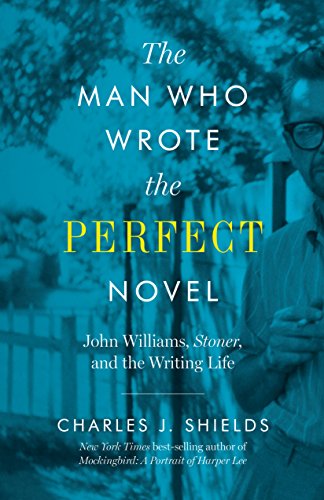

About 20 years ago, Bill Crider recommended a novel to me. It was John Williams’s Stoner (1965), a novel I had heard of but didn’t own at the time. I found a copy of Stoner and read it. Stoner tells the story of a farmer’s son who goes to college initially to become a better farmer. But Stoner falls in love with Literature and switches to becoming an English Major. Needless to say, his parents are disappointed because they planned on having Stoner work on the farm and continue the operation when they got too old. Stoner’s transition to academic life and becoming a professor provides an appealing story to guys like Bill and me who followed the same career trajectory.
Charles J. Shields’s biography of John Williams covers Williams’s three marriages, his many affairs, and his feud with Yvor Winters. I was more interested in the parts that dealt with Williams’s novels. I had no idea that Western writer Nelson C. Nye panned William’s Butcher’s Crossing in The New York Times Book Review. Nye wrote: “It is practically plotless, an account of four men who go out to hunt buffalo, find them, slaughter them, and are caught by cold weather…. The story, however, contains little excitement and moves as though hauled by a snail through a pond of molasses.” (p. 121)
Stoner achieved modest success when it was first published. Yes, Stoner is far from a perfect novel. But, as the years went by, Stoner attracted more of an audience. Now, it’s considered one of the finest novels of academic life ever written. Have you read Stoner? GRADE: B
TABLE OF CONTENTS:
Introduction ix
Part 1. Nothing But the Night
1. He comes from Texas 3
2. “Ho, ho! wasn’t I the character then?” 15
3. Rough draft 28
4. Key West 39
5. Alan Swallow
6. Love 58
Part 2. Butcher’s Crossing
7. The Winters Circle 73
8. “Natural liars are the best writers” 85
9. Butcher’s Crossing 100
10. Fiasco 112
Part. 3. Stoner
11. “It was that kind of world” 137
12. “The Williams affair” 153
13. Stoner 163
Part 4. Augustus
14. Bread loaf and “up on the hill” 183
15, The good guys 192
16. “Long life to the emperor!” 208
Part 5. The Sleep of Reason
Poem : “An old actor to his audience” 221
17. “How can such a son of a bitch have such talent?” 2
18. In extremis 233
Epilogue. John Williams redux 249
Acknowledgements 256
Notes 259
Works Consulted 286
A John Williams Bibliography 289
Index 297
Yes, several times. And more than an academic novel, although it was, I thought it was about a man who fell in love with the wrong things. He valued his career, a middling one at best, over having a happy family life, friends, etc. Really a sad story.
Patti, John Williams captures the details of academic life. After STONER, Williams wrote AUGUSTUS, a novel about the Roman Emperor, a novel that won a National Book Award.
No, though I have always meant to. Every once in a while there is a spate of publicity, some other author praising it as a favorite book, and I mean to get to it, but so far I haven’t. Maybe this time.
Jeff, Charles J. Shields points out that the popularity (and sales) of STONER waxes and wanes over the years.
I read it several years ago when it was rescued from obscurity by NYRB and was the subject of several “this is the best novel you never read” type articles. It’s a really good novel though, as Patti said, terribly sad. It moved me to try “Butcher’s Crossing”, which was a mistake. I was unaware of the NYTBR review by Nye, but it sounds accurate. My admiration for “Stoner” got me through about 50 pages of it, but no further.
Michael, as you might surmise, STONER includes many aspects of John Williams’s life.
No—but I like Patti’s assessment: a man who falls in love with the wrong things. That could be the leitmotif of much 20th century literature.
Deb, but you and I have fallen in love with the Right Things: Trollope, desserts, and Disco!
Don’t forget pizza!
Jeff, you are so right! Pizza rules!
Never read Stoner but I have a copy of his novel Butcher’s Crossing in one of my many TBR piles.
Steve, I have a copy of BUTCHER’S CROSSING somewhere around here, too. But after reading Nelson Nye’s review, I think I’ll skip reading it.
I read in about 1970, and I agree with Patti’s assessment. I also kept waiting for something to happen that didn’t, so I was a little disappointed.
Rick, I’m tempted to read the copy of John Williams’s AUGUSTUS that I’ve had on my shelves for decades.
Sounds like something I’d hate! I’m surprised someone didn’t say, “I didn’t read Stoner, I was a stoner!”
Bob, you said it so you own it!
Never even heard his name …
But I must explain that I didn’t have money to buy many books and so depended on what our small city library offered.
The America House brought a basket of new books from their center every two weeks so I looked at these.
And when I got my first real job in IT (in 1969) I already was hooked on SF so spent all my money there – including regular shopping trips to London and (much later in the late 1980s) to NYC.
Wolf, John Williams’s books sold better after his death. Williams was a heavy smoker.
I just checked my fiction hardcovers and no sign of Stoner. I had a copy, but it must have gone by-by in one of my cleanouts. I honestly can’t remember if I read it.
Kent, copies of STONER are easy to acquire on the Internet. STONER is worth reading, but it’s sad.